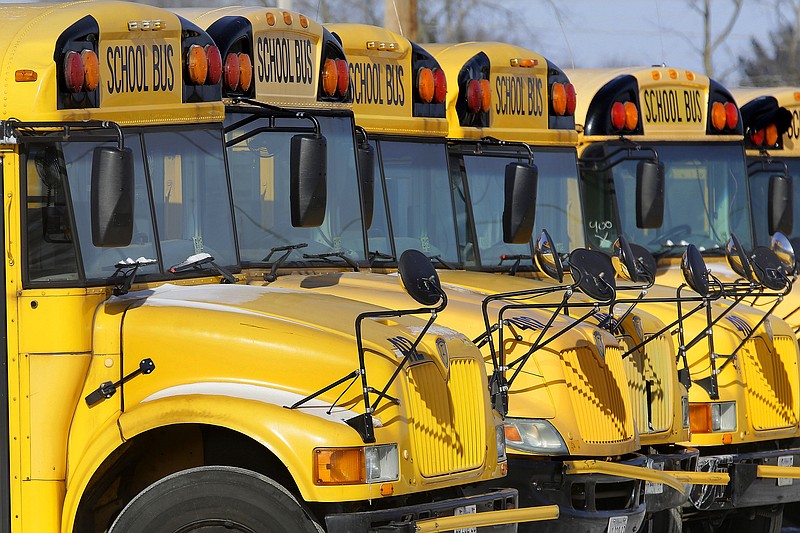The Arkansas Board of Education on Thursday approved the release for public review of a set of draft rules for "school transformation contracts."
The transformation contracts, authorized by the Arkansas LEARNS Act or Act 237 or 2023, allow an outside organization -- such as the governing body of an open-enrollment charter school -- to manage an academically struggling school or school district. The intent of a transformation contract between a district and an outside organization is to ultimately return the management to the traditional school system once "accelerated, meaningful, and sustainable increases in student achievement have been achieved."
The newly approved draft rules that spell out how the contracts would work are subject to public reaction at a yet to be scheduled public hearing, and possible revisions.
The draft rules would return to the Arkansas Board of Education and the Arkansas Legislative Council for final action later this year.
Stacy Smith, Arkansas Division of Elementary and Secondary Education deputy commissioner, told the Education Board that a transformation contract -- already in use in the Marvell-Elaine School District in Phillips County -- is a way to do something "drastic" and give a "shot in the arm to a school" or district that is failing students.
"Transformation contracts are an opportunity for people to roll up their sleeves and try something different," Smith said, "because what they have been doing is not working, and they can try something and not be penalized."
The 222-student Marvell-Elaine district is operating this year with a $200,000 transformation contract.
FEF-Arkansas is the contractor that is managing the district, which is under state control. Arkansas Education Secretary Jacob Oliva is serving in lieu of a locally elected school board for the district.
FEF-Arkansas is affiliated with the Friendship Education Foundation that sponsors open-enrollment charter schools in Little Rock, Pine Bluff and North Little Rock.
Speaking at Thursday's Education Board meeting on the Arkansas State University campus in Jonesboro, Smith said school districts don't have to wait until the state assumes control of their districts to engage a transformation contract partner.
Oliva pointed to the Watson Chapel School District in Jefferson County "as a district that needs to find a partner" to ward off state control.
He made the comment after the Education Board received a report that the Jefferson County system was struggling to maintain enrollment, hire staff, create a master class schedule for next year and meet special education mandates.
The transformation contract provision is one of multiple components of the LEARNS Act that was introduced and championed by Gov. Sarah Huckabee Sanders last year to overhaul public education.
Other components of the LEARNS Act include a $50,000 minimum teacher salary, expanded publicly funded vouchers for tuition and other private and home school costs, literacy tutoring grants, and 75 hours of community service to qualify for high school graduation.
The transformation contract terms in law and in the draft rules state that a public school district with a D- or F-graded school or that is in "Level 5 - intensive support" shall be exempt from state sanctions and continue to qualify for funding if the school board enters into a contract with either an open-enrollment charter school organization or with another entity approved by the state Education Board.
However, even districts/schools that don't have Ds, Fs or a Level 5 label can enter into a transformation contract, according to the draft rules.
The rules would prohibit a current or former operator of an open-enrollment public charter school to enter into a transformation contract if the entity in the previous three years operated a school that had a D or F grade or had significant financial audit findings.
The draft rules provide that a district's school board retain its powers and responsibilities with respect to oversight and governance of the transformation campus.
The duties of the transformation campus operator, according to the draft rules, include oversight of administrative and financial operations, student and school accountability, school safety, maintenance of facilities, transportation, food service, special education services, extracurricular activities, teacher training, curriculum development, gifted education, and career and technical education.
The proposed rules offer incentives for entering into transformation contracts, including a pass for the school or district from state sanctions -- including consolidation with another district -- for up to two years
And the draft rules authorize the state Elementary and Secondary Education Division to provide financial incentives to support transformations.
Other points in the draft rules include:
A transformation campus operator must identify annual goals to achieve so that the campus can return to the management of a traditional school or district.
A transformation campus operator shall provide quarterly reports to the Division of Elementary and Secondary Education for the initial two years of the contract.
All grants and donations received by the transformation campus operator for the benefit of the public school district shall be the public school district's property.
All facilities and land belonging to the school district before the transformation contract remain the property of the district.
The transformation contract must include terms for terminating the contract.

